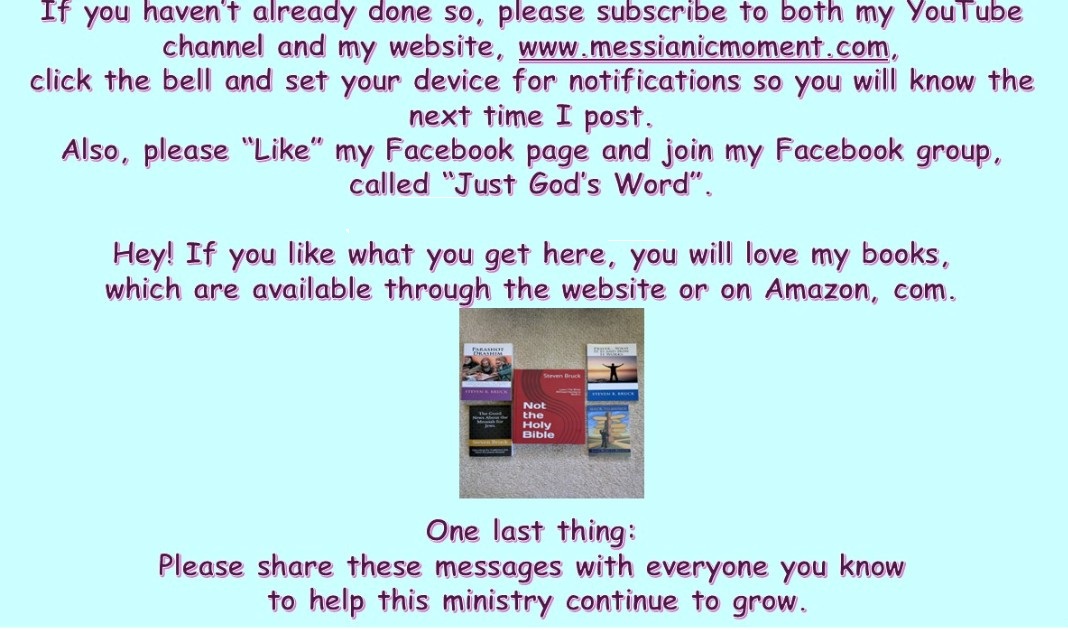How often have you heard people tell you that you are saved by faith, and faith alone? Then someone else tells you that James said faith without works is dead. Then someone else tells you that works are useless.
Then someone else tells you all you need to do is ask God because the Bible says that all who call on his name will be saved.
For Pete’s sake, make up your mind- which is it?
If you prefer to watch a video, click on this link: Watch the video.

Now here’s the kicker: works and faith do not save you, but they keep you saved.
Now that you are really confused or upset, let’s step back a bit and start with what does it really mean to be “saved”?
From my nearly three decades as a “saved” person, to me being saved means that when the Acharit haYamim, the End Days, are over and we all come before God when he is sitting on his Throne of Judgement, that we will be judged as righteous, i.e., without sin, and thereby allowed to remain in his divine presence for the rest of eternity.
But, since none of us are righteous, our “righteousness” being nothing more than filthy rags (Isaiah 64:6), the only way we can be viewed as righteous is by means of the righteousness of Yeshua the Messiah. And that is possible only by accepting him as our Messiah.
So, what saves us is being sinless, and since the Bible is clear that no one is without sin, only because of Yeshua’s sinless life and his sacrifice can his blood, which is forever available to us, cleanse us and allow us to come before God as sinless, which is what saves us.
We are not saved by faith or works or anything else other than the way God said we are to be saved from the very beginning, which is through the sacrificial system defined in Leviticus, which shows us that forgiveness of sin must be through the shedding of innocent blood.
Now, as for faith and works, they are essential to stay saved. It is faith in Yeshua being the Messiah God promised to send that allows us to ask forgiveness through Yeshua’s sacrifice, and it is doing as God said to do, not some religion, that demonstrates the truth of our faith.
Christianity calls these acts of obedience “works” and we Jews call them “mitzvot”, but what is important is that whatever you call them, they are the things that God said to do and not what some religion tells you to do.
Within Judaism we have different levels of obedience, from secular Jews who are more interested in Jewish heritage and identify with Jewish culture, history, and peoplehood rather than religious belief or ritual observance to Chasidic Jews, living strictly by Halacha (as outlined in the Talmud) and calling all other sects of Judaism “Goyim”.
(Goyim in Hebrew means “nations”, but in modern language
it is used as a derogatory identifier of non-Jews).
In Christianity, sadly, nearly everything any one of the many, MANY different Christian religions tells you to do is almost always in complete opposition or totally ignoring what God said he wants us all to do, which is found only in one place in the entire Bible and that is in those first 5 books called the Torah.
That’s it, Folks- the only thing that saves us from eternal damnation is to be forgiven of sin, and the only way you can be forgiven of sin (now that the temple is gone) is through accepting Yeshua as your Messiah, and obeying what God said to do in the Torah.
Now, you may ask, “Are you saying that even if I faithfully accept Yeshua as my Messiah, call on the name of the Lord for forgiveness of my sins by means of Yeshua’s sacrifice, but don’t obey the Torah I will be damned, anyway?”
I can’t answer that because I am not God, who makes the final decision.
What I can say is that I believe your faith in God and Yeshua is demonstrated through how you live your life and is an intregal part of God’s decision about your eternal future.
Let me leave you with this: I believe because no one can be 100% obedient to the Torah, it isn’t how successful we are at obeying all of God’s mitzvot, but how hard we try that God will take into consideration.
The ones who should be worried are the ones who know what God wants them to do, but refuse to even try because they just don’t want to.
Thank you for being here and please remember to like and comment on these messages, which helps me get better exposure on the Internet. And please share these messages with everyone you know, even non-believers. Hey, after all, you never know how fertile the soil is until you plant a seed in it.
That’s it for today, so L’hitraot and Baruch HaShem!
